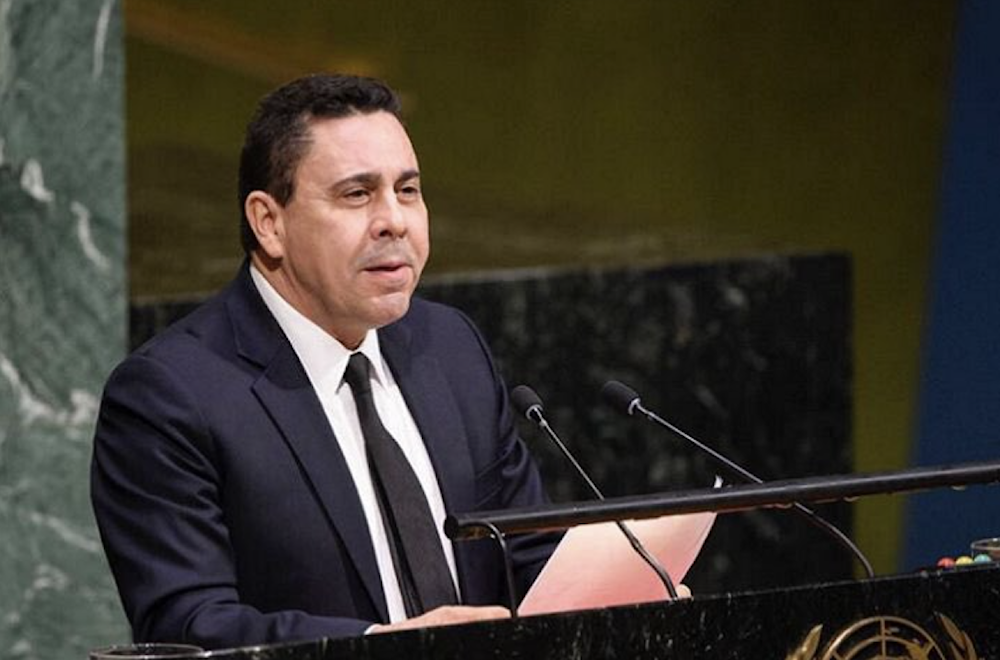Venezuela at UNSC: US committing 'extrajudicial killings'
The UN Security Council meets in emergency session after US airstrikes on alleged Venezuelan drug traffickers spark accusations of regional destabilization.
-

Ambassador Samuel Moncada, Permanent Representative of Venezuela to the UN, on June 6 2024. (Social media)
The UN Security Council held an emergency session on Friday at the request of Venezuela, following a series of US military airstrikes in Caribbean waters. The strikes, which Washington says targeted Caracas-backed drug traffickers, have triggered global alarm, with Venezuela accusing the United States of violating international law and threatening regional peace.
Venezuela: US committing 'extrajudicial killings'
In a strongly worded address, Venezuela's representative condemned the strikes as illegal and described them as “extrajudicial killings.”
“The United States has bombed four small vessels in the Caribbean, killing unarmed civilians who posed no threat. This is not self-defence; these are extrajudicial killings,” the delegate said.
He accused the US of a “campaign of propaganda and disinformation” and warned of an imminent armed assault, citing a massive buildup of US military forces near Venezuelan waters.
“This includes over 10,000 personnel, combat aircraft, missile destroyers and cruisers, assault troops, assets used in special operations and even a nuclear submarine,” the delegate said, adding that the “belligerent action and rhetoric” makes it “rational to anticipate that in the very short term an armed attack is to be perpetrated against Venezuela.”
He called for the repatriation of 78 Venezuelans “abducted in the United States,” and emphasized that while “Venezuela does not seek war with anyone,” it has the “sacred duty to defend what is ours” if attacked.
US defends strikes as 'self-defense' against armed threats
The US delegate defended the strikes as necessary and proportionate, saying the Trump administration is “on the offensive against drug trafficking and cartels”.
“The United States will not be flooded by cocaine, fentanyl and other drugs being brought into its borders from Venezuela and elsewhere, killing Americans,” he said.
He confirmed that the Tren de Aragua and Cartel de los Soles have been designated as armed, non-state terrorist groups, and that their operations are considered an “armed attack against the United States.”
“[We have] reached a critical point where we must use force in self-defence and in defence of others,” he added.
While acknowledging that the strikes have been narrow in scope, he stated that further action remains on the table, and reaffirmed that the US does not recognize Nicolás Maduro or his allies as Venezuela’s legitimate government.
Miroslav Jenča, UN Assistant Secretary-General for Europe, Central Asia and the Americas, briefed the Council and urged restraint, recounting a timeline of US military activity in the region.
“We continue to emphasize the need for all efforts to counter transnational organized crime to be conducted in accordance with international law, including the UN Charter,” he said, calling for de-escalation and constructive dialogue.
China: US actions threaten sovereignty and Human Rights
“In the name of combating drug trafficking, the US has deployed forces in the Caribbean waters off the coast of Venezuela.”
He noted that Venezuelan fishing boats were seized, and warned that “unilateral and excessive enforcement operations” violate human rights and freedom of navigation.
“Such actions severely infringe on other countries’ sovereignty and threaten regional peace and security,” the Chinese delegate added.
“The international response must be rooted in the principle of ‘common and shared responsibility’ through a cooperative approach, in strict conformity with international law," Pakistan's representative noted, stressing that dialogue in good faith is the only sustainable tool for resolving global disputes.
The Republic of Korea’s representative expressed concern over the deteriorating situation in Latin America, and stressed:
“Despite differing interpretations of the UN Charter’s core principles, multilateralism, dialogue, and regional cooperation remain essential.”

 4 Min Read
4 Min Read








